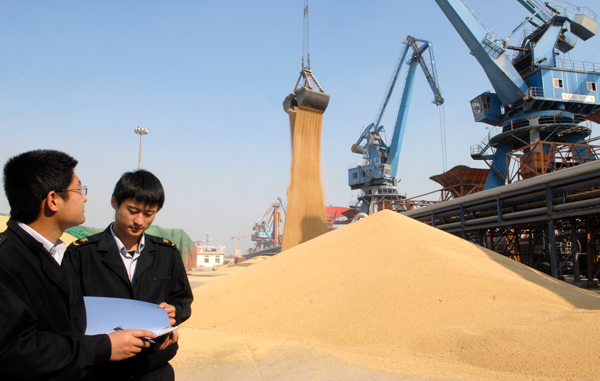Media Report

- Financial Times reports: "China's demand for commodities picked up in November with the world's largest consumer of raw materials boosting imports of copper, crude oil, soyabeans and steel-making ingredient iron ore. Shipments of copper hit 470,000 tonnes, up 42 per cent from October, while imports of crude oil hit 9.04m barrels per day – their second highest recorded level – and 94.54m tonnes of iron ore arrived in the country, up from 79.5m the previous month. Soyabeans imports were 8.68m tonnes versus 5.86m in October. The stronger-than-expected import data should help provide a prop to commodity prices, which have been rattled hard by concerns about slowing economic growth in China, said traders. Copper in particular has been hit hard, falling 6 per cent over the past 10 days to $6,500 a tonne. 'The rise [in imports] backs up our view that a tightening copper-concentrate market is pushing many buyers into the refined market to satisfy its copper units,' said analysts at ANZ, adding that China's oil imports should also allay concerns about weak demand. Iron ore prices recently rose 3 per cent to $68.4 a tonne. China's commodity buying typically picks up in November after weakening in October due to a week-long public holiday. The slowdown was particularly pronounced this year because of the Communist party congress."
- Quartz reports: "The United States has long led the world in technology. But there's strong reason to believe that as artificial intelligence (AI) becomes increasingly widespread, stateside engineers will quickly have to contend with another global powerhouse—China. A report jointly published by New York-based research consultancy Eurasia Group and Beijing-based VC firm Sinovation Ventures on Dec. 6 outlines how China has been making rapid advances in AI over the past few years. At present, write Paul Triolo of Eurasia Group and Kai-Fu Lee of Sinovation ventures, China lags behind the US when it comes to engineering talent, as well as in the hardware required to build effective "autonomous AI"—robots, self-driving cars, and other physical machines. But in effect, the 'US-China AI duopoly is not only inevitable. It has already arrived.' And China's AI prowess will soon match that of the US, perhaps even surpassing it, says the report. One major advantage China enjoys over the US, for example, is access to a massive pool of data."
- The Economist comments: "Three hours into his marathon speech to the Communist Party congress in October, as delegates glanced surreptitiously at their watches, Xi Jinping, China's president, sprang a surprise. "The practice of shuanggui," he suddenly announced, "will be replaced by detention." Shuanggui is a system in which party members accused of corruption are locked up in secret jails, beyond the reach of the judiciary and isolated from family or lawyers. In 2016 Human Rights Watch, an NGO, documented cases of beatings, sleep deprivation, stress positions and other forms of torture in shuanggui jails. That makes it sound as if Mr Xi's unexpected moveis a step forward for human rights. It may not be. The abolition of shuanggui is the most visible part of a sweeping reform that in effect sets up an entirely new branch of government. Called the National Supervision Commission, it is designed to streamline administration, improve the implementation of policy and eliminate protectionist rules in the cities and provinces. A draft law governing the commission appeared in November; three provinces, Beijing, Zhejiang and Shanxi, have been giving it a trial run as it undergoes a public review. It is proving highly controversial, but is likely to get the go-ahead nationwide in March."
Calendar
- 2017-12-07 China criticizes India over drone crash inside border
- 2017-12-06 No. 3 Person of the Year 2017: Xi Jinping
- 2017-12-05 U.S. trade gap soars as imports from China hit record high
- 2017-12-04 Apple CEO backs China’s vision of an ‘open’ Internet as censorship reaches new heights
- 2017-12-03 China's Xi says country will not close door to global internet
- 2017-12-01 China sends its top actors and directors back to socialism school
- 2017-11-30 Obama Told Xi He Wants to Help Preserve Ties, State Media Says
- 2017-11-29 China has 'grave concerns' about North Korea's latest missile test
- 2017-11-28 How the U.S. and China Differ on North Korea
- 2017-11-27 What you need to know about Beijing’s crackdown on its “low-end population”
News
- Financial Times China's commodity demand picks up in November
- Quartz The reasons why China will equal—or surpass—the US in artificial intelligence
- Voice Of America Bill Targeting Authoritarian Ex-leader Will Distance Taiwan from China
- Reuters China to push structural reforms, curb risks in 2018
- Reuters China warns of imminent attacks by "terrorists" in Pakistan
- Fortune China Targets Transparency as Regulators Prepare for a Record Number of IPOs
- BBC News Lego wins first copyright case against China copies
- Bloomberg Trudeau Leaves China Empty-Handed
- Fortune Here's What Chinese Investors Are Most Excited About
- BBC News Lego wins first copyright case against China copies
- Quartz South Koreans are not cool with how Americans and Chinese are being reassured over North Korea
- Quartz China and India are now arguing over a crashed drone near their disputed border
- Fortune Bicycles Are Piling Up on Chinese Streets. What's a Bike-Sharing Company Like Ofo to Do?
Commentary
- The Economist China gets a new system to curb corruption—and ideological lapses
- The Diplomat Why China 'Respects' Putin's Bid for the Russian Presidency
- The Wall Street Journal China's Startups Are Only Pawns in the Game
- Quartz China's role in Zimbabwe's regime change says more about China than Zimbabwe
- The Economist China plans one last push in the toilet revolution
- Axios Axios China
- The Diplomat IMF Warns China of 3 Financial Stability Risks
